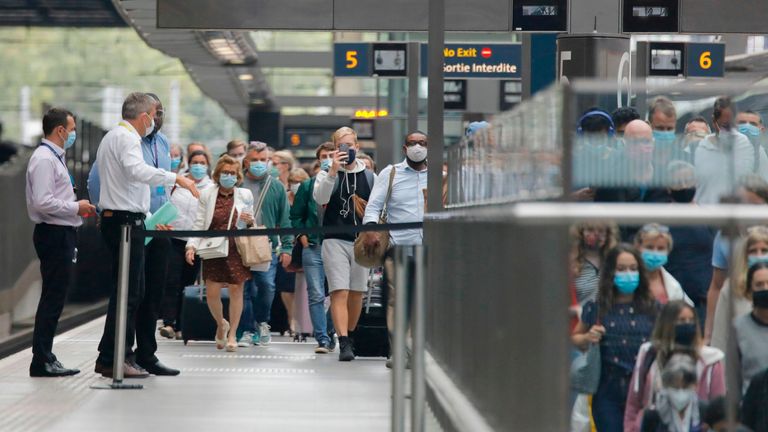Extending quarantine to a further six nations, including France, is “another devastating blow” to the travel industry already reeling from the COVID-19 pandemic, it has been warned.
The decision to impose restrictions on one of the biggest destinations for holidaymakers at the height of summer, having already been done to Spain, will lead to job losses unless urgent targeted support is provided by the government, according to the trade.
Shares in airlines easyJet, British Airways and Ryanair to as well as the travel giant TUI were down on Friday.
The industry has urged an end to the “stop and go” changes to so-called travel corridors at a national level and stressed the need for a regional approach.
Testing of arriving passengers is also being called for, aimed at avoiding the requirement to self-isolate for those whose results come back negative.
Travellers arriving from France after 4am on Saturday will be required to quarantine for 14 days due to fears over rising numbers of coronavirus cases in the country.
The move came after Boris Johnson warned ministers would be “absolutely ruthless” in deciding on whether to impose the self-isolation requirement.
The Netherlands, Monaco, Malta, Turks & Caicos and Aruba have also been added to the quarantine list from 4am on Saturday.
France’s secretary of state for European affairs said the UK’s decision would lead to “reciprocal measures” across the Channel.
The move to extend the restrictions has caused dismay within the travel industry, already brought to its knees by global lockdowns aimed at curbing the spread of the COVID-19.
Tim Alderslade, chief executive of Airlines UK, the industry association representing UK-registered carriers, said: “It’s another devastating blow to the travel industry already reeling from the worst crisis in its history.
“Having the political will to move to a sub-national approach to quarantine, in addition to a testing regime for arriving passengers so that those testing negative can avoid having to self isolate – which other countries like Germany have already implemented – is urgently needed to provide carriers and customers with additional certainty around the ability to operate this autumn and winter, avoiding broad-brush, weekly ‘stop and go’ changes to travel corridors at a national level, which have proven so disruptive to airlines and passengers alike.”
:: Listen to the Daily podcast on Apple Podcasts, Google Podcasts, Spotify, Spreaker
A spokeswoman for the travel trade organisation Abta said: “The government’s measures to restrict travel will result in livelihoods being lost unless it can step in with tailored support for the travel industry.
“The announcements relating to Spain, and now France, impact the two biggest destinations for British holidaymakers at the height of the summer season, affecting an industry that has had its trade significantly restricted since the start of this crisis.
“At this time of recession, a plan is urgently needed to protect the 221,000 jobs the travel industry sustains.”
Dyan Crowther, chief executive of HS1 Ltd, which runs the high speed rail line between London and the Channel Tunnel and links the capital via international routes to Paris, Brussels and Amsterdam, told Sky News the latest quarantine move was a setback.
Speaking to the Ian King Live programme, she also echoed criticism of the blanket nature of the restrictions and argued they should be more localised.
She said: “It’s a major, major blow for passengers. We were starting to see the green shoots of recovery, of passengers returning to travel to the continent and this has just put us backwards.”
Ms Crowther added: “There has to be a better alternative. Maybe doing something that’s more localised. Doing what some of the airports have been calling for, which is testing on arrival.
“COVID-19 isn’t going to go away so as a system we need to respond to it to enable passengers to travel and to enable the economy to recover.
“Just putting blanket bans on isn’t going to help the economy and it’s not going to help the businesses that rely on the system that we operate today.”
She went on: “Not just my business, but the transport sector and businesses associated with the sector have been significantly affected.
“We need passengers to come back onto our railways.”



